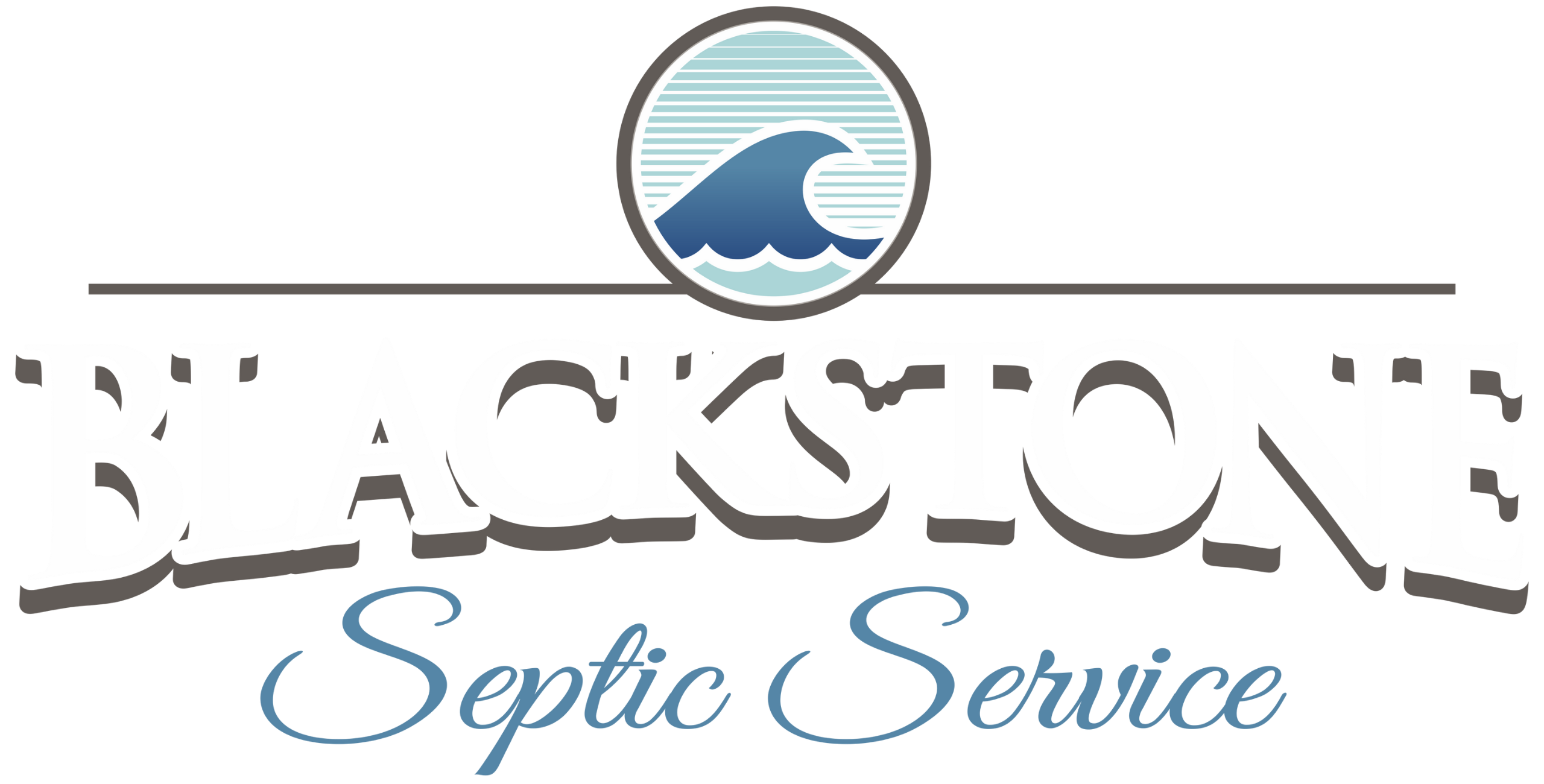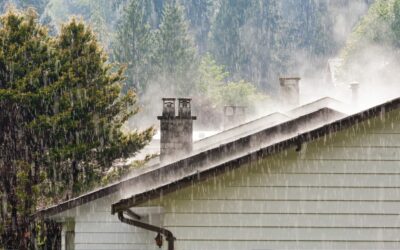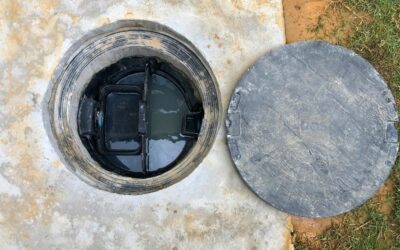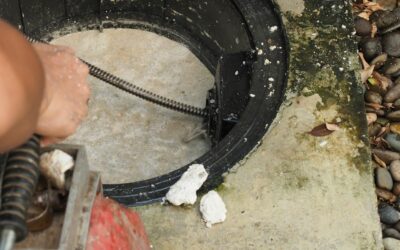Every homeowner knows that clogged drains and pipes are a part of life. When faced with a stubborn clog, many turn to chemical drain cleaners like Drano or Liquid Plumber. But if you have a septic system, it’s important to understand the potential risks.
Chemical drain cleaners work through powerful reactions to clear clogs. Unfortunately, these reactions can be harmful to your septic system. Septic systems rely on beneficial bacteria to break down waste and keep everything running smoothly. Chemical cleaners, however, can destroy these bacteria, leading to complications such as sludge buildup and even septic system failure.
While the manufacturers of Drano and Liquid Plumber claim their products are septic-safe, many plumbing experts and research studies disagree. Even small amounts of these chemicals can disrupt the delicate balance of bacteria in your septic tank.
Can you use Drano with a septic system? In short: It’s not a good idea.
- Chemical drain cleaners like Drano and Liquid Plumber can harm your septic system.
- These products destroy the beneficial bacteria that break down waste.
- Using them can lead to costly repairs and system failures.
Being aware and choosing safer, septic-friendly alternatives can save you time, money, and a whole lot of stress.
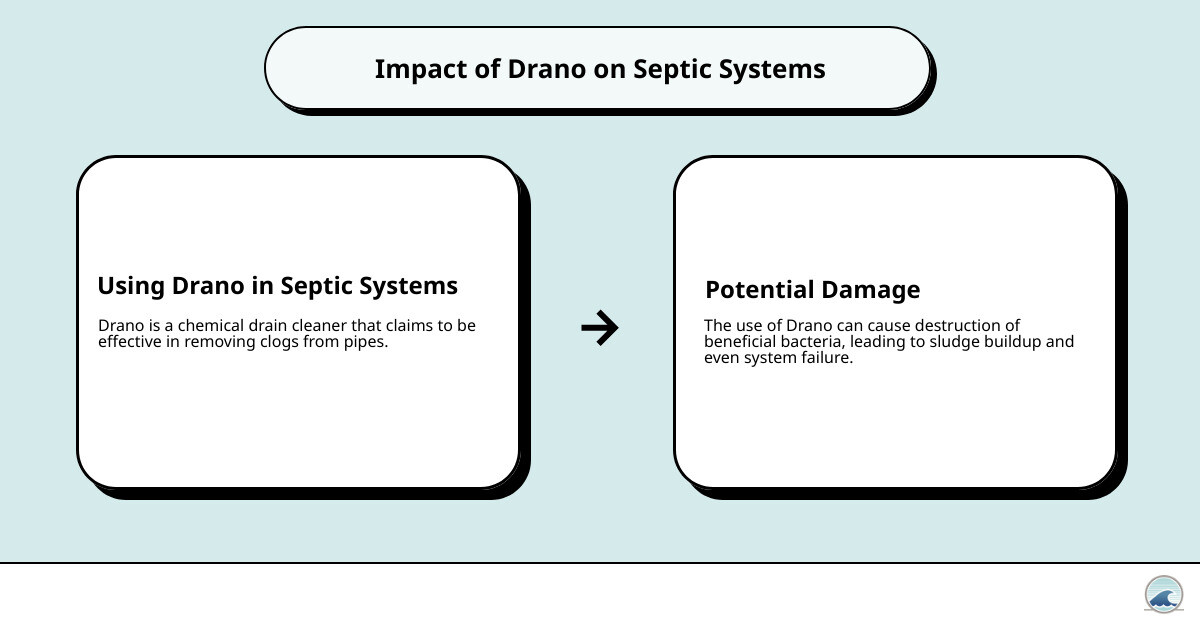
Table of Contents
How Does Drano Work?
Drano is a popular chemical drain cleaner that many people turn to when faced with a clogged pipe. But how does it actually work?
The Chemical Reaction
Drano works through a powerful chemical reaction. The typical ingredients in Drano include:
- Bleach
- Aluminum
- Lye (sodium hydroxide)
- Sodium chloride (salt)
- Sodium nitrate
When you pour Drano down a drain, these chemicals react with each other and with the clog. This reaction generates a lot of heat, which helps break down the clog.
Breaking Down Organic Matter
The lye in Drano is particularly effective at breaking down organic matter like hair, fat, and food particles. It reacts with fats and oils to create soap and glycerol, which are easier to wash away. The heat from the reaction helps to melt and loosen the clog.
The Role of Aluminum
Aluminum in Drano reacts with the lye to produce hydrogen gas. This reaction creates bubbles that help to agitate and break up the clog, making it easier for the other chemicals to do their work.
Sodium Nitrate and Sodium Chloride
Sodium nitrate and sodium chloride (salt) also play a role in the chemical reaction. Sodium nitrate helps to break down organic material, while sodium chloride can help to create a more effective chemical reaction.
The Heat Factor
One of the key elements of Drano’s effectiveness is the heat produced by these chemical reactions. The heat helps to melt grease and break down other materials that are causing the clog. However, this heat can also be a problem. It has the potential to weaken pipes, especially if they are old or made of plastic.
Risks to Your Septic System
While Drano may be effective at clearing clogs, introducing drain cleaning chemicals can be harmful to your septic system. The chemicals can kill the beneficial bacteria that are essential for breaking down waste in your septic tank. This can lead to sludge buildup and other issues, making it necessary to pump your tank more frequently.
In summary: Drano works through a powerful chemical reaction involving bleach, aluminum, lye, sodium chloride, and sodium nitrate. While effective at breaking down clogs, the heat and chemicals can also pose risks to your plumbing and septic system.
Next, we’ll explore the effects of Drano on septic systems and whether the manufacturer’s claims hold up against expert opinions.
The Importance of Septic Bacteria
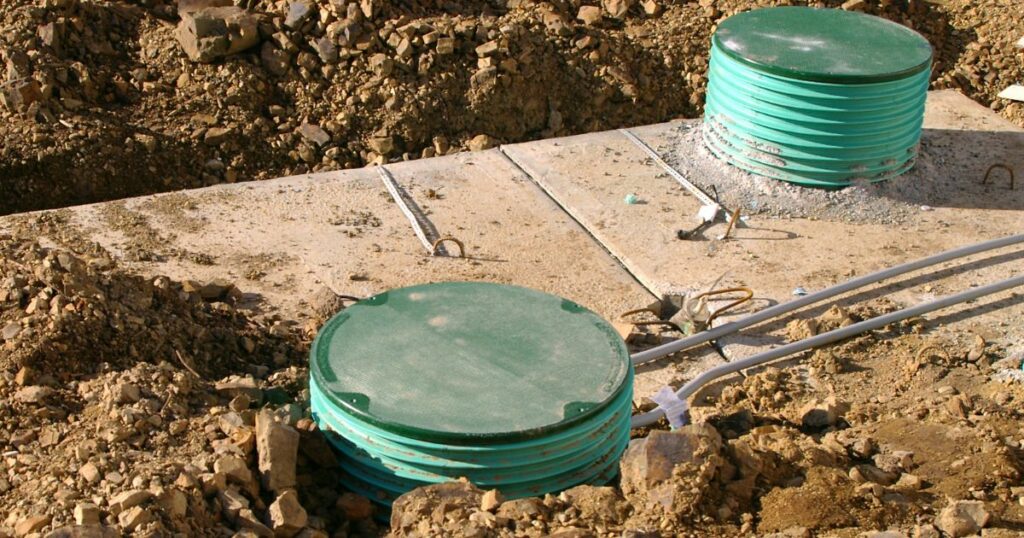
Septic bacteria are the unsung heroes of your septic system. These tiny organisms are crucial for breaking down waste and keeping your system running smoothly.
The Role of Bacteria in Your Septic Tank
Inside your septic tank, bacteria work tirelessly to digest organic household wastewater. They break down solids into sludge and separate floatable matter like oils and grease. Without these bacteria, your tank would fill up quickly, leading to frequent and costly pump-outs.
What Happens When Bacteria Are Destroyed?
When you use harsh chemical cleaners like Drano, you risk killing these beneficial bacteria. This can throw your septic system out of balance. Sludge will build up faster, and your tank could overflow, causing a messy and expensive problem.
The Leach Field and Its Microbial Properties
The leach field, also known as the drainfield, is another critical part of your septic system. It disperses the treated liquid effluent into the soil. Here, more bacteria help to neutralize contaminants. If these bacteria are killed off by chemicals, your leach field could become sterile. This would require professional intervention, and in extreme cases, digging up and replacing the entire field.
Enzyme Treatments: A Septic-Safe Solution
Enzyme treatments are a septic-safe alternative to chemical drain cleaners. These treatments introduce beneficial enzymes and bacteria into your tank, helping to break down waste without harming your system. They support the natural processes in your tank and can even reduce the need for frequent pump-outs.
In summary: The bacteria in your septic tank and leach field are essential for breaking down waste and maintaining your system. Harsh chemicals like Drano can kill these bacteria, leading to sludge buildup and potential system failure. Enzyme treatments offer a safer, more effective way to keep your septic system healthy.
Next, we’ll explore the effects of Drano on septic systems and whether the manufacturer’s claims hold up against expert opinions.
Can You Use Drano with a Septic System?
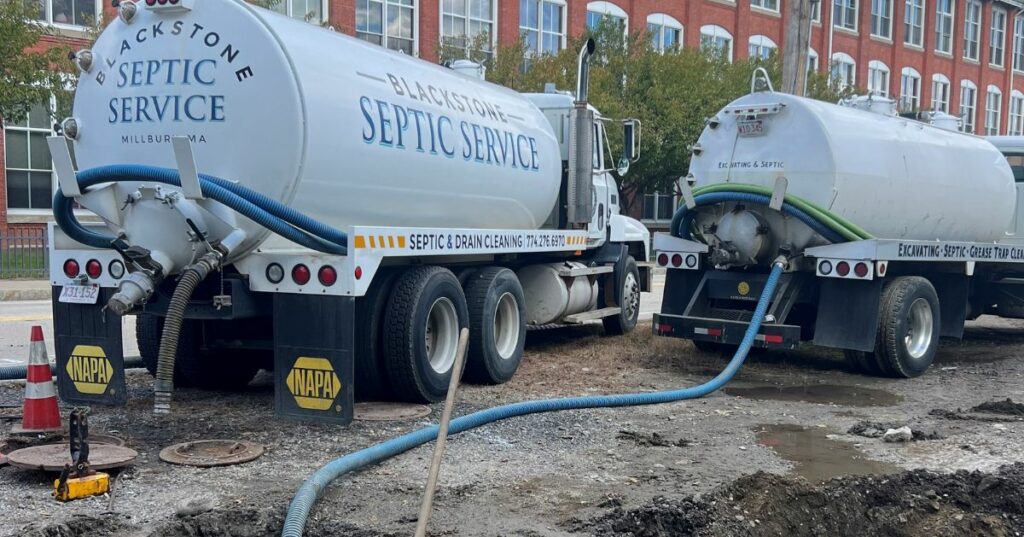
Effects of Drano on Septic Systems
Drano claims its products are “100% septic safe”. But is this really true?
Professional plumbers and septic experts often disagree. They caution against using chemical drain cleaners like Drano in any plumbing system, especially those connected to a septic tank.
Why? The strong chemical reaction Drano produces can be harmful. The product contains sodium hypochlorite(bleach), which has powerful microbial properties. This means it can kill bacteria—not just the bad ones causing the clog, but also the essential bacteria in your septic tank.
Here’s how it works:
- Chemical Reaction: When Drano encounters organic matter, it generates a lot of heat. This reaction helps break down clogs but can also weaken pipes over time.
- Bacteria Destruction: The heat and chemicals, particularly chlorine, can kill the bacteria that break down waste in your septic system.
- Leach Field Sterilization: If these chemicals reach the leach field, they can sterilize the soil, preventing it from breaking down waste effectively.
Studies and expert opinions back this up. For example, a 2004 paper by Cornell researchers found that household chemicals, including drain cleaners, can destroy beneficial bacteria in septic systems. Another study from 1987 by Mark Gross indicated that even small amounts of chemical cleaners can disrupt septic tank performance.
Manufacturer Claims vs. Expert Opinions
Drano and similar products like Liquid Plumr claim their products are safe for septic systems. They argue that their ingredients degrade quickly and won’t harm the bacteria in your tank.
However, expert opinions tell a different story. Most professional plumbers advise against using chemical drain cleaners in septic systems. They argue that the potential damage to your septic tank and pipes outweighs the convenience of a quick fix.
Key points from experts:
- Chemical Drain Cleaners: These can kill the beneficial bacteria in your septic system, leading to sludge buildup and frequent pump-outs.
- Septic Safety: Using chemical cleaners can weaken pipes and sterilize your leach field, leading to costly repairs.
- Better Alternatives: Plumbers often recommend mechanical methods like pipe snakes or natural solutions like vinegar and baking soda for clearing clogs.
In summary, while Drano claims their products are septic safe, the consensus among experts is that it’s better to avoid chemical drain cleaners altogether. The risks to your septic system and plumbing are simply too high.
Alternative Methods for Unclogging Drains
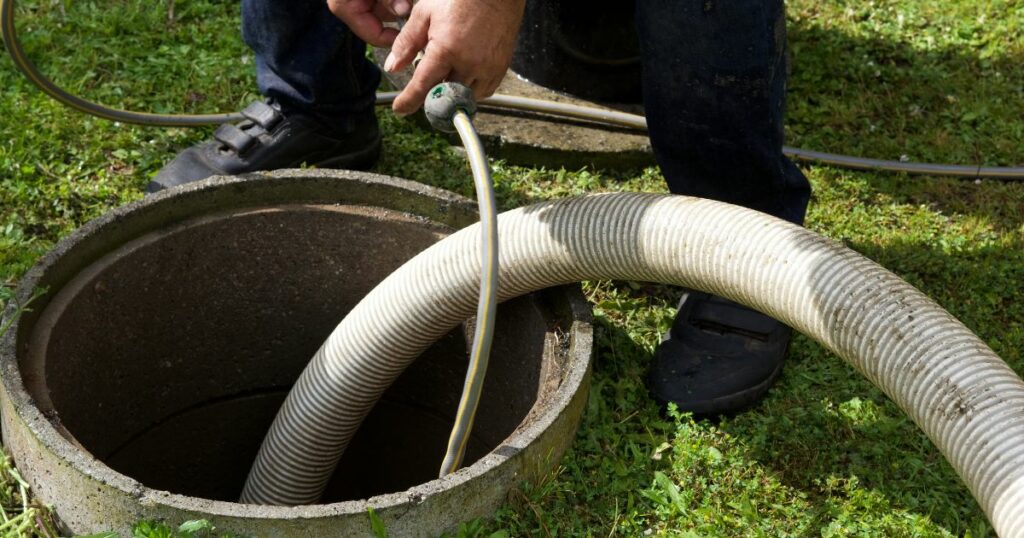
When dealing with clogs, it’s best to avoid chemical cleaners like Drano. Instead, try these septic-safe methods:
Using a Plunger
A plunger is a simple tool that can effectively dislodge blockages in both kitchen and bathroom drains.
- Create a Seal: Ensure the plunger covers the entire drain opening.
- Push and Pull: Use firm, consistent motions to create suction and pressure.
- Check the Drain: After a few attempts, check if the water drains away.
Plungers are great for minor clogs and don’t harm your septic system.
Vinegar and Baking Soda Method
This method uses common household items to clear clogs without harming your septic tank.
- Pour Baking Soda: Pour 1 cup of baking soda down the clogged drain.
- Add Vinegar: Follow with 1 cup of white vinegar.
- Wait: Let the mixture fizz for about 30 minutes.
- Flush with Hot Water: Finish by carefully pouring boiling water down the drain.
This combination creates a bubbly reaction that helps break down clogs and is completely septic-safe.
Pipe Snake
A pipe snake, or drain auger, is a tool that can reach deep into pipes to remove stubborn blockages. Another natural method involves using boiling water to clear minor clogs caused by soap, grease, or hair.
- Insert the Snake: Push the metal coil into the drain until you feel resistance.
- Twist and Turn: Rotate the handle to break up the clog.
- Pull Out Debris: Slowly pull the snake out, bringing the debris with it.
Pipe snakes are very effective but must be used carefully to avoid damaging your plumbing. If unsure, consider calling a professional plumber.
These methods are not only effective but also safe for your septic system. Avoiding chemical cleaners will help maintain the microbial balance in your septic tank, ensuring it functions properly for years to come.
Septic-Safe Drain Cleaners
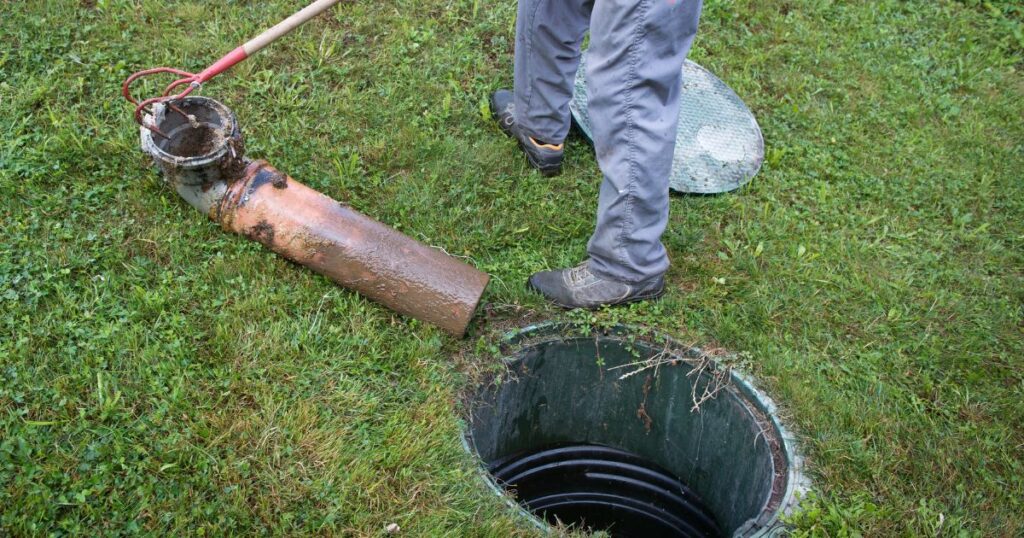
When dealing with a clogged drain in a home with a septic system, it’s crucial to use septic-safe products. These options help maintain the delicate balance of bacteria essential for your septic system to function properly.
Enzyme Treatments
Enzyme treatments are a popular choice for maintaining healthy septic tanks. These treatments contain natural enzymes and bacteria that break down organic matter, such as hair, grease, and food particles, without harming the beneficial bacteria in your septic tank.
- How They Work: Enzymes speed up the decomposition process of organic waste.
- Benefits: Safe for septic systems, environmentally friendly, and effective for routine maintenance.
Pro Tip: Use enzyme treatments regularly to keep your drains clear and your septic system healthy.
Septic-Safe Products
When choosing drain cleaners, always look for septic-safe labels. These products are specifically designed to be safe for septic systems and usually contain natural or biodegradable ingredients.
- Common Ingredients: Enzyme-based formulas, natural acids (like citric acid), and plant-based surfactants.
- Avoid: Products with bleach, sodium hydroxide, or other harsh chemicals.
Did You Know? According to Blackstone Septic Service, using the right products can extend the life of your septic system and reduce the need for frequent pumping.
Ingredient Check
Before using any drain cleaner, check the ingredients. Here’s a quick checklist to help you determine if a product is septic-safe:
- Look for: Enzymes, natural acids, and biodegradable ingredients.
- Avoid: Sodium hypochlorite (bleach), sodium hydroxide (lye), and other strong chemicals.
Quick Tip: If you’re unsure about a product, consult with a professional or refer to reputable sources like the U.S. Environmental Protection Agency (EPA).
Using septic-safe drain cleaners not only helps in maintaining your septic system but also protects the environment. For more information on how to keep your septic system in top shape, check out our next section on frequently asked questions about Drano and septic systems.
Conclusion
Maintaining a healthy septic system is crucial for the long-term functionality of your home’s plumbing. While Drano and other chemical drain cleaners may seem like a quick fix, they can cause more harm than good to your septic system. The chemicals in these products can destroy the beneficial bacteria essential for breaking down waste, leading to costly repairs and potential system failure.
At Blackstone Septic Service, we understand the complexities of septic system maintenance. Our team of experts is dedicated to providing you with the best solutions for keeping your septic system in top shape. Whether it’s routine maintenance, emergency services, or advice on septic-safe products, we’re here to help.
Why Choose Blackstone Septic Service?
- Expertise: With over 75 years of experience, our highly trained technicians know the ins and outs of septic systems.
- Regular Maintenance: We offer comprehensive inspections and regular pumping to prevent sludge buildup and ensure your system runs efficiently.
- Customer Education: We believe in empowering our customers with knowledge. Understanding what should and shouldn’t go down your drains is the first step in preventing septic system failure.
- Customer Satisfaction: Your satisfaction is our top priority. We strive to provide excellent service and reliable solutions.
Taking proactive steps to maintain your septic system not only saves you money in the long run but also protects your home and the environment. Choose Blackstone Septic Service for all your septic system needs and enjoy peace of mind knowing your system is in good hands.
Contact us today for more information on septic system maintenance or to schedule an inspection. Let’s work together to ensure your septic system remains a reliable and efficient part of your home for years to come.
Frequently Asked Questions about Drano and Septic Systems
Is Drano Safe for Septic Systems?
Drano claims that their products are safe for septic systems. They state that the ingredients degrade rapidly and won’t harm the bacteria in your tank. However, many professional plumbers disagree.
Experts argue that chemical reactions from products like Drano can indeed disrupt the delicate balance of bacteria in your septic tank. These bacteria are crucial for breaking down waste. Without them, your system can malfunction.
What Are the Risks of Using Drano in a Septic System?
Using Drano in your septic system poses several risks:
- Bacteria Destruction: The harsh chemicals in Drano can kill the beneficial bacteria in your septic tank. This can lead to a buildup of waste, as there’s nothing to break it down.
- Leach Field Damage: When the bacteria in your septic tank are killed, the waste isn’t properly processed. This can result in a clogged leach field, which may need expensive repairs or even replacement.
- Plumbing Issues: Drano’s strong chemicals can corrode pipes over time, leading to leaks and other plumbing issues. This is especially true if you have older pipes made from materials like metal or rubber.
What Are Some Septic-Safe Alternatives to Drano?
If you’re dealing with a clogged drain and have a septic system, consider these septic-safe alternatives:
- Plunger: A simple plunger can often dislodge blockages in the kitchen or bathroom drain. It’s effective and doesn’t harm your septic system.
- Vinegar and Baking Soda: This natural remedy can clear minor clogs. Pour half a cup of baking soda down the drain, followed by half a cup of white vinegar. Cover the drain and wait for about 30 minutes, then flush with hot water.
- Pipe Snake: A pipe snake, or plumber’s snake, is a metal coil that can reach deep into your pipes to remove stubborn clogs. It’s a mechanical solution that doesn’t involve harmful chemicals.
- Enzyme Treatments: These treatments use natural enzymes to break down organic material in your pipes. They are safe for septic systems and can be used regularly to maintain clear drains.
By choosing these alternatives, you can keep your septic system healthy and avoid the risks associated with chemical drain cleaners.
Our Content
Our experienced septic tank specialists have carefully reviewed and edited all of the content to ensure that it meets our high standards for quality and accuracy. At Blackstone Septic Service, our mission is to provide unparalleled expertise and service excellence in the realm of septic system care. With a dedicated team of professionals committed to delivering the best septic tank treatments for your septic tank system, we specialize in comprehensive services such as routine maintenance of clogged drains, septic tank pumping, and new system installations.
Blackstone Septic Service is a family-owned company with highly trained technicians, with over 75 years of experience in septic tanks, pipes and systems.
